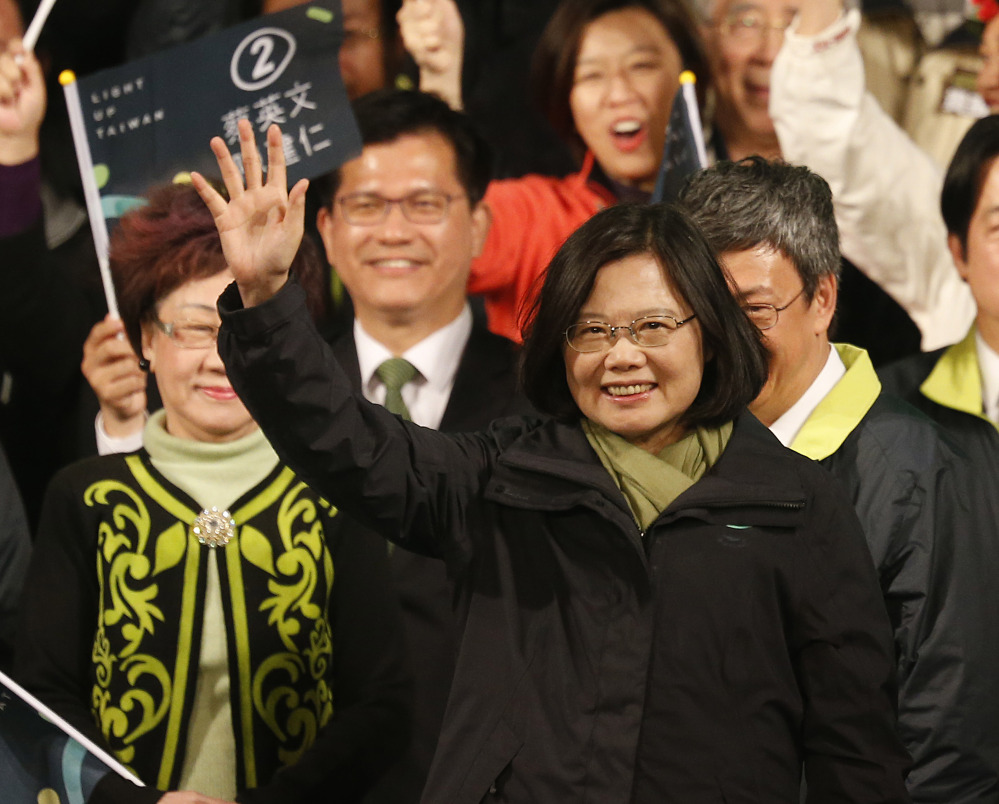TAIPEI, Taiwan — Taiwanese opposition leader Tsai Ing-wen won a landslide victory in the island’s presidential election Saturday to become its first female leader, telling China she wanted stable relations but would defend her country’s sovereignty and dignity.
Tsai vowed to work with China to maintain peace and stability across the Taiwan Strait, but Beijing responded to the results frostily, saying good relations depended on her renouncing any prospect of Taiwan ever achieving formal independence from the mainland – something she is unlikely to do.
Tsai, head of the Democratic Progressive Party, received more than 56 percent of votes, way ahead of Eric Chu of the ruling Nationalists, or Kuomintang (KMT), with 31 percent.
For eight years, the KMT had promised that improving ties with China would rescue Taiwan’s ailing economy, but although ties did improve, economic growth slowed further, and the argument was firmly rejected by voters Saturday.
Now, victory for the more independence-minded DPP raises the prospect of a new era of uncertainty in relations with China. Tsai vowed to maintain good relations with Beijing and signaled some flexibility by saying she was prepared to move past partisan politics on the issue. But she also vowed to protect Taiwan’s sovereignty.
“I also want to emphasize that both sides have a responsibility to find mutually acceptable means of interaction that are based on dignity and reciprocity,” she said in a television news conference Saturday night. “We must ensure that no provocation or accidents take place.”
“Our democratic system, national identity and international space must be respected,” she said. “Any forms of suppression will harm the stability of cross-strait relations.”
The U.S. State Department said it looked forward to working with Tsai. “We share with the Taiwan people a profound interest in the continuation of cross-Strait peace and stability,” it said in a statement.
But China responded with a vow to “resolutely oppose any form of separatist activities seeking ‘Taiwan independence,’ ” and a demand Tsai renounce that idea.
“On major issues of principle concerning national sovereignty and territorial integrity, our will is firm as rock and our attitude is consistent,” China’s Taiwan Affairs Office said in a statement. “We are willing to strengthen contact and exchange with any parties and groups that recognize that the two sides belong to one China.”
On the surface, this election was all about current President Ma Ying-jeou’s failure to breathe life back into one of Asia’s former economic tigers. But at a deeper level, the vote was about Taiwan’s efforts to find its feet after two decades as a democracy and reimagine itself as a nation quite separate from its Communist big brother across the Taiwan Strait.
Send questions/comments to the editors.



Success. Please wait for the page to reload. If the page does not reload within 5 seconds, please refresh the page.
Enter your email and password to access comments.
Hi, to comment on stories you must . This profile is in addition to your subscription and website login.
Already have a commenting profile? .
Invalid username/password.
Please check your email to confirm and complete your registration.
Only subscribers are eligible to post comments. Please subscribe or login first for digital access. Here’s why.
Use the form below to reset your password. When you've submitted your account email, we will send an email with a reset code.